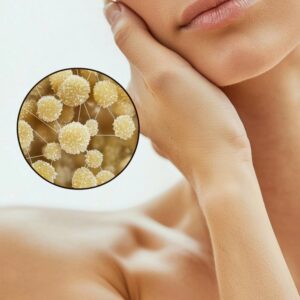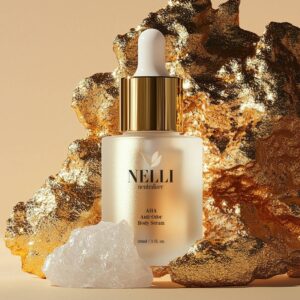
Ah, puberty. That volatile cocktail of hormones, insecurity, and—yes—bad body odor. As someone who has dissected the anatomy of skincare more times than I’ve changed serums, let me tell you: adolescence doesn’t have to smell like a locker room.
Let’s decode the science, debunk some myths, and offer seven genuinely effective solutions to help teens take control of their confidence.
Table of Contents
What Causes Bad Body Odor During Puberty?
Contrary to popular belief, sweat isn’t the enemy—it’s practically scentless. The real culprit? Bacteria. When those flourishing little microbes on your skin feast on your sweat, they produce volatile organic compounds (VOCs). That, my dear reader, is the true genesis of bad body odor.

During puberty, sweat glands (particularly apocrine glands) become hyperactive, secreting a protein-rich fluid that bacteria adore. The result? A pungent perfume no one asked for.
Is Bad Body Odor a Sign of Puberty in Girls?
Yes, bad body odor is a common and natural sign of puberty in girls. During puberty, hormonal changes trigger the activation of sweat glands, particularly the apocrine glands, which are located in areas like the underarms and groin. These glands produce a thicker, protein-rich sweat that, when broken down by bacteria on the skin, leads to body odor.
Why Does Puberty Cause Bad Body Odor?
- Hormonal Changes: During puberty, there is an increase in hormones like androgens, which stimulate the apocrine glands to produce more sweat.
- Increased Sweat Production: As the body grows and changes, sweat production becomes more pronounced, particularly in the areas that are most prone to bacterial growth.
- Bacterial Breakdown: Sweat itself is odorless, but when it interacts with bacteria on the skin, it produces compounds that emit the characteristic smell of body odor.
It’s a completely normal part of development, but some girls may feel self-conscious about it. Choosing the right deodorant that works with the body—like Nelli Neutralizer Anti-Odor Serum—can help manage and neutralize body odor without blocking natural sweat production.
Body Odor Puberty Stage: Understanding the Changes
The body odor puberty stage is a pivotal part of a teen’s development, marking the time when hormonal shifts create noticeable changes in the body’s odor.
As puberty begins, typically between the ages of 8 and 13, girls experience a surge in androgen hormones, such as testosterone, which are responsible for the activation of sweat glands, particularly the apocrine glands. These glands are located in areas prone to sweating, like the underarms, groin, and feet, and their activation is a primary cause of body odor.
What Happens During the Bad Body Odor Puberty Stage?
- Hormonal Surge: Increased levels of androgens trigger sweat glands to start producing a thicker, more protein-rich type of sweat. This sweat, when broken down by bacteria on the skin, results in bad body odor.
- Sweat Composition Changes: Before puberty, a girl’s sweat is mostly water, but once puberty begins, the apocrine glands start secreting sweat that contains fatty acids and proteins, creating an ideal environment for bacteria to thrive. This leads to stronger body odor.
- Increased Sensitivity: Puberty also comes with increased skin sensitivity. As your skin adjusts to these hormonal changes, it may react differently to common skincare products, making it important to choose deodorants that are gentle yet effective.
Managing Body Odor During Puberty
The good news is that body odor during puberty is a completely normal and temporary stage. With the right care and products, it’s entirely manageable. Opt for products that not only combat odor but also support the skin’s natural processes.
For example, Nelli Neutralizer Anti-Odor Serum works with the body’s natural sweat production, neutralizing odor without interfering with sweat glands. Its scientifically backed formula ensures that you stay fresh all day, no matter how intense the day’s activities or climate.
Understanding the body odor puberty stage helps remove the stigma surrounding this natural transition and empowers young girls to feel more confident during their development.
7 Proven Hacks to Beat Bad Body Odor During Puberty
With the right knowledge and tools, you can stay fresh, confident, and in control. Below are seven scientifically proven, dermatologist-backed hacks to help you conquer bad body odor during puberty—without harsh chemicals, confusing advice, or shame. Whether you’re a teen navigating this for the first time or a parent searching for real solutions, these tips are practical, effective, and rooted in science (not myths).
1. Shower Daily with a Gentle Antibacterial Cleanser
Clean skin is your first line of defense. Washing daily with a pH-balanced antibacterial soap reduces the bacterial population responsible for producing bad body odor. Focus on underarms, groin, and feet.
2. Wear Breathable, Natural Fabrics
Natural fabrics like cotton or bamboo allow better airflow and wick away moisture. Synthetics often trap sweat and bacteria, worsening odor. Change clothes daily—especially underwear and socks.

3. Try Acid-Based Body Washes
Alpha and beta hydroxy acids like glycolic and salicylic acid exfoliate dead skin cells, lower skin pH, and prevent bacterial overgrowth. Use them 2–3 times a week to avoid over-drying.
4. Use a Deodorant That Works with Your Body (Not Against It)
When puberty arrives, so does sweat — and with it, the often frustrating reality of bad body odor. But instead of battling your body’s natural processes with aluminum-heavy antiperspirants, there’s a smarter, more skin-aligned solution: Nelli Neutralizer Anti-Odor Serum.
This is not your average deodorant. It’s a cutting-edge serum designed to respect your skin while radically neutralizing odor — all without blocking sweat glands. Here’s how it works, and why it’s unlike anything else on the market:
🌿 Why Nelli Neutralizer Is a Breakthrough in Bad Body Odor Control
🧪 Five Clinical-Grade Acids for Total Odor Neutralization
These carefully selected exfoliating and antimicrobial acids work together to lower skin pH and disrupt the bacterial ecosystems that cause odor:
- Glycolic Acid (AHA)
A tiny but mighty molecule that dissolves dead skin cells and breaks down the biofilm bacteria thrive in. It reduces the buildup of keratin and sebum — the fuel source for odor-causing microbes — while evening skin tone. - Lactic Acid (AHA)
A gentle, hydrating exfoliant that not only smooths the skin surface but also helps lower pH to prevent bacterial overgrowth. Bonus: it boosts natural moisturization factors, making it ideal for sensitive underarms. - Mandelic Acid (AHA)
Larger in molecular size, this oil-soluble acid penetrates slowly, offering antibacterial action without irritation. Particularly effective against Corynebacterium, the main bacteria behind body odor. - Salicylic Acid (BHA)
Oil-soluble and anti-inflammatory, it gets deep into sweat ducts to clear blockages and reduce redness or folliculitis. It also has antimicrobial properties, keeping bacteria in check. - Gluconolactone (PHA)
A polyhydroxy acid known for its ultra-gentle exfoliation, antioxidant activity, and skin-strengthening effects. It hydrates while restoring the skin barrier — making it perfect for adolescent skin going through hormonal changes.
🔬 Intelligent Delivery Technology
- Dimethyl Isosorbide & Ethoxydiglycol
These advanced carriers deliver the active ingredients deep into the skin without degradation, ensuring long-lasting efficacy throughout the day. Think of them as the GPS-guided taxis for your actives — targeted, potent, and time-released.
💧 Skin-Soothing and Barrier-Rebuilding Ingredients
Puberty can leave skin more reactive, which is why this serum is loaded with calming, hydrating elements:
- Aloe Barbadensis Leaf Water
Soothes irritation, reduces inflammation, and supports skin healing — a must for post-shaving care. - Sodium Hyaluronate
A superior form of hyaluronic acid that penetrates deeply to hydrate and plump, keeping the skin balanced even after exfoliation. - Dipotassium Glycyrrhizate
Derived from licorice root, it reduces redness and itching while also helping to regulate sebum production — another hidden contributor to odor. - Tea Tree Leaf Water
Naturally antimicrobial and refreshing, it boosts the bacteria-fighting benefits without causing dryness or imbalance.

🏋️♀️ Built for Real Life (Not Just Marketing Claims)
Whether you’re sweating through exams, dance class, or tropical humidity, this formula holds up. It’s been engineered to perform under extreme conditions and is safe for teens experiencing hyperhidrosis, hormonal changes, or simply the daily pressures of growing up.
5. Change Towels and Bed Linens Frequently
Bacteria and sweat accumulate on towels and pillowcases. Wash towels every 2–3 uses and change pillowcases twice a week. Make sure towels dry fully between uses to prevent mildew.
6. Watch Your Diet—Odor Starts From Within
What you eat can have a significant impact on bad body odor. Certain foods and drinks can cause your sweat to smell stronger or more unpleasant by affecting the way your body processes and releases toxins. Here’s how your diet might be contributing to your body odor:
- Spicy Foods: Ingredients like garlic, onions, and hot peppers contain compounds that can be released through your sweat, intensifying body odor.
- Caffeine: High amounts of caffeine can stimulate sweat glands, leading to increased sweating and more odor.
- Red Meat: High-protein diets, especially those rich in red meat, can cause stronger body odor as proteins break down in the body.
- Alcohol: Alcohol is metabolized and released through your skin, often contributing to a noticeable, pungent smell.
- Dairy: For some individuals, dairy can cause increased body odor due to the breakdown of certain compounds in the body.
To minimize body odor, try focusing on a balanced diet that includes plenty of fruits, vegetables, and water. Foods high in fiber and antioxidants help flush toxins from the body more efficiently, while staying hydrated ensures that sweat is more diluted and less odorous. If you’re still struggling with bad body odor despite dietary changes, incorporating a product like Nelli Neutralizer Anti-Odor Serum can help control and neutralize odor naturally.
7. Invest in Science-Backed Skincare for Long-Term Results
Back to our favorite innovation: Nelli Neutralizer Anti-Odor Serum. Unlike traditional deodorants, it leverages smart delivery agents like Dimethyl Isosorbide and Ethoxydiglycol to ensure the active acids penetrate deeply and remain potent throughout the day. It also contains calming and hydrating ingredients like aloe, sodium hyaluronate, and dipotassium glycyrrhizate—soothing skin while keeping odor at bay.
When to See a Dermatologist for Bad Body Odor
While bad body odor during puberty is a common and natural occurrence, there are times when it might be a sign of an underlying issue that requires professional attention. If your body odor seems unusually strong, persistent, or difficult to manage despite good hygiene practices, it may be time to consult a dermatologist. Here are some signs to watch out for:
- Persistent or Excessive Odor: If the body odor continues unabated even with regular bathing and deodorant use, or if it’s unusually strong, it could indicate a medical condition like hyperhidrosis (excessive sweating) or bromhidrosis (foul-smelling sweat). A dermatologist can help identify the cause and recommend treatments.
- Sudden Onset of Bad Body Odor: If body odor develops suddenly and more intensely than normal, especially without the usual trigger of puberty, it might be worth getting checked. This could be related to hormonal imbalances, metabolic issues, or other underlying health conditions that need attention.
- Rashes or Skin Irritation: If the odor is accompanied by rashes, irritation, or unusual skin changes, it could indicate an infection or skin condition such as fungal infections or eczema that may require treatment.
- No Response to Over-the-Counter Products: If you’ve tried multiple deodorants, including ones with different active ingredients (like aluminum-free formulas), and nothing seems to control your odor, it’s time to speak to a dermatologist. A professional can recommend more effective treatments or prescribe medications to help regulate sweat and odor.
- Excessive Sweating: If you’re sweating excessively even in cooler conditions or during periods of rest, this could point to primary hyperhidrosis, a condition where excessive sweating occurs without a clear medical cause. A dermatologist can diagnose this and offer solutions like prescription antiperspirants or even Botox injections.
Seeing a dermatologist isn’t just about treating the symptoms of bad body odor; it’s about understanding the root cause and finding the most effective solutions for your skin. If you’re experiencing any of these signs, don’t hesitate to schedule a consultation with a dermatologist. They’ll help you navigate through your concerns and find the best treatments to keep you feeling fresh and confident.
The Final Verdict: Conquering Bad Body Odor
There’s no reason a coming-of-age story needs to involve overwhelming bad body odor. With a combination of smart hygiene, science-backed skincare, and a few wardrobe tweaks, puberty can feel (and smell) a lot less stressful.
Remember: sweat is natural, but odor doesn’t have to be.





